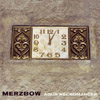
Masami Akita is always at his best when he is either working with a well-chosen collaborator (like Christoph Heemann or Richard Pinhas) or paying tribute to something he loves (like bondage photography or his pet chickens). This unusual and surprisingly listenable 1998 release falls squarely into the latter category, as Akita ferociously cannibalizes the progressive rock that meant so much to him as a teenager.
The title track opens the album in relatively straightforward Merzbow fashion, with a quasi-industrial locked groove that is quickly obliterated by an avalanche of blistering white noise.Atypically, however, the static eruption quickly subsides and the insistent rhythm again takes over.While Masami does not depart very much from his signature sound, the jousting interplay between rhythm and ruin is fairly dynamic and compelling.Then, at about the halfway point, the dust settles a bit and a lurching rock groove fades in.At first, Akita lets it unfold with little molestation, although it is a bit distorted and the cymbals sound warped and delayed.Then, of course, the floodgates are opened and the beat drowns in the expected sea of chaos (though not without a few textures that fall outside the usual Merz-palette).
The lengthier piece that follows, "Contrapuntti Indian," goes one step further and actually begins with a looped melodic guitar figure.Naturally, it is quickly ripped to shreds by another abrasive flurry of ear-shredding dissonance, but it pops up again a little later with an extremely cool stumbling tom-tom beat beneath it.Akita gets the balance between rhythm and savagery just right here: this is one of strongest pieces in the entire Merzbow discography.
The remaining three songs don’t dally with melody again, but they all follow a similar seesawing trajectory with tensely repeating rock snippets battling to stay afloat amidst tumultuous washes of abstract noise.The relatively short "Farsa Del Buen Vivir" is another of the album’s clear highlights though, due to its insistent quasi-Eastern rhythm and Akita’s especially unhinged blasts of feedback terrorism.Merzbow’s white noise assault is far more effective when it broken up with oases of structure and space than as a punishing and unrelenting hour-long roar.
It is very easy to focus on the fact that Masami has spent the last few decades repeating himself to the point of self-parody, but it is also impossible to deny that he has nevertheless remained a reliably distinctive and crushingly visceral artist.He may only have one trick, but it’s admittedly a pretty great trick (even fish raining from the sky would get boring if it happened every day).On occasions such as this, when Akita steps out of his comfort zone into a different dynamic context, it is possible to experience his vicious onslaught with fresh ears and be floored all over again. Aqua Necromancer often gets unfairly lumped in with the various "Merzbow with drums" albums, but that completely misses the point.Masami Akita has no intention of maintaining a groove here- rather he has choreographed a frenzied struggle between order and entropy.This is the sound of rock music being torn apart by a pack of snarling wolves, but not without a fierce struggle.
Samples:
 
Read More

